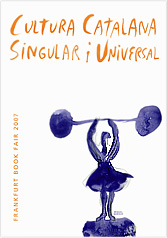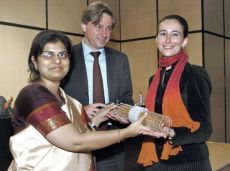Press Releases 

(EFE).- Today India passed the baton as guest of honour at the Frankfurt Book Fair to Catalan culture, which will be the guest of honour in 2007, with one of the most ambitious programmes in the history of the Fair.
Anna Soler-Pont, the commissioner of the Catalan presentation, received a glass cylinder inscribed with Cyrillic, Latin, Arabic and Korean characters from the hands of her Indian opposite number, Nuzmat Hassan. Inside there is a second, wooden, cylinder inscribed with fragments of books representing the two cultures, Tirant lo Blanc in the case of Catalan and the Mahabarata in the case of India.
"It's a bit like being in the Olympic Games" joked the Catalan writer Carme Riera during the ceremony, presided by the German writer Ilija Trojanow, in which India passed the baton as guest of honour to Catalan culture.
I don't know if it's the Fair's intention to bring the world of sport and the world of books closer together, but I think it's a good idea because all writers would like to have the same number of readers as the most popular sports have as fans", she said.
IRL stand
That was the only allusion made to the similarity between the ceremony to pass the baton and a relay race since the rest of the ceremony was devoted to questions of literature and linguistic pluralism. Four authors, two Indians and two Catalans, went on to read excerpts from their texts.
Expositor Trojanow introduced the ceremony by saying "Sometimes it is the enormous that attracts us at the Fair", in reference to this year's guest of honour, India, with it is great diversity of languages, "and on other occasions what attracts us is the small", as, it is to be hoped, will be the case next year. He went on to say, "Next year we will be concentrating intensely on a small literary language".
The two Indian writers read their texts first. The poet Salma read her poems in Tamil with a consecutive translation into German, and then Vinod Kumar Shukla read some brief texts in Hindi which were also translated. Trojanow then gave the floor to the Catalans. Riera read a fragment from one of her novels and then Oscar Pujol presented his Sanskrit-Catalan dictionary in an English-language conversation with Trojanow.
It is one of the two Sanskrit dictionaries in a bilingual edition with a Romance language. The other one is French, but according to Pujol, it is a copy of a German-Sanskrit dictionary. Trojanow pointed out that this Catalan-Sanskrit dictionary represented a step forward in this type of work insofar as the entries for each word also had something of the character of an encyclopaedia entry.
Pujol has provided, in addition to the Catalan equivalent for the word in Sanskrit and its etymology, a more thorough explanation in the form of short articles to help understand the culture behind the language. Sanskrit is the language of India's ancient sacred texts and is still used for liturgical purposes. As an example, Pujol read the entry for the word karma in Catalan.
After the readings by the writers, which Trojanow defined as "a journey from Tamil and Hindi to Catalan through English and German", the director of the Frankfurt Book Fair, Jürgen Boos, proceeded with the part of the ceremony in which India passed the baton as guest of honour to Catalan culture. "India's participation as guest of honour this year has been wonderful, almost impossible to better", he said, "but I'm sure our Catalan friends will try to do just that."
The Indian commissioner then went on to wish Catalan culture even greater success than they had had before going on to present the double cylinder.
All the participants pointed out how this year, with India's 24 official languages, a great deal had been said about linguistic pluralism and the importance of language for identity and how, in all probability, with Catalan culture the subject would be raised again in a different form next year.
The short introduction to Indian literature published specially for the Frankfurt Book Fair mentions how, for many years, Indian writers writing in English had to constantly justify their position as Indian writers. That all came to an end with the publication of Midnight's Children written by Salman Rushdie in an English that was full of the resonances ofmany of India's regional languages.
The Catalans seem to have resolved the problem in another way, without searching for their Rushdie, by dividing their programme as guest of honour into three sections.
One section devoted to Catalan literature understood as literature written in Catalan, a second section about the Catalan publishing industry which also includes authors writing in Spanish, and a third section devoted to various other forms of cultural expression in general.







